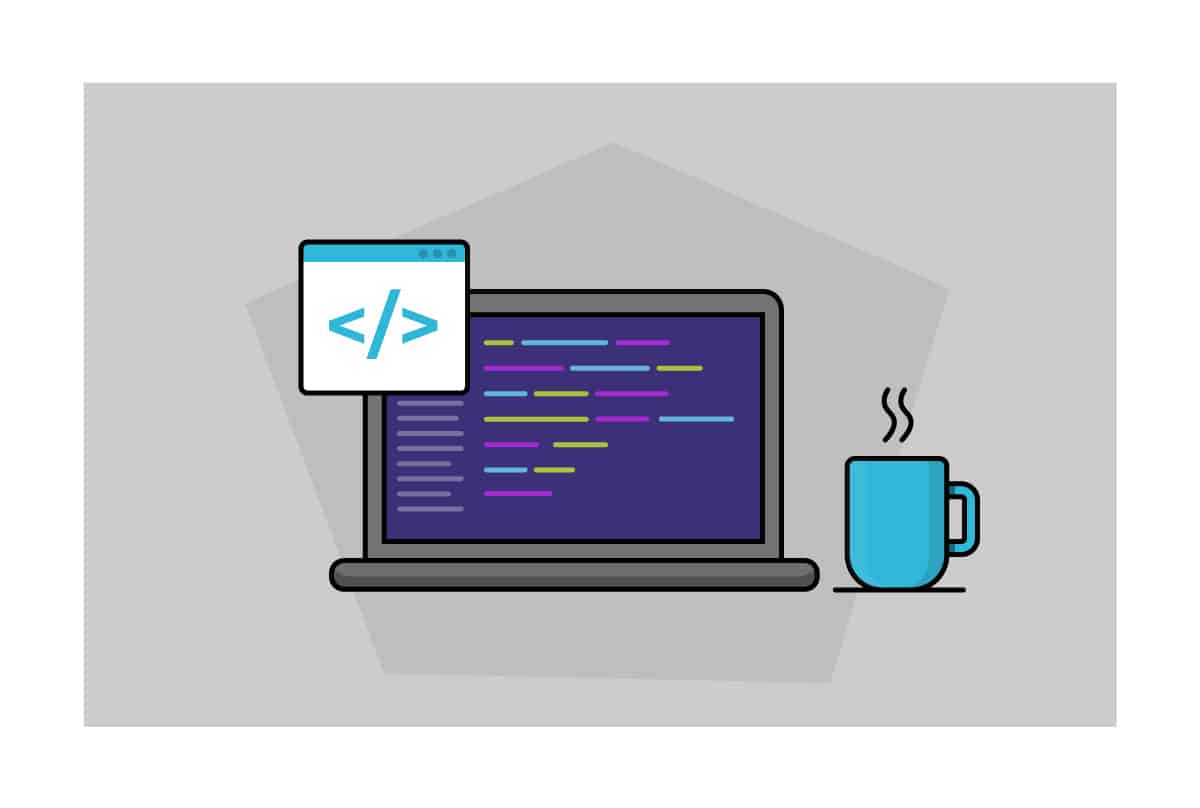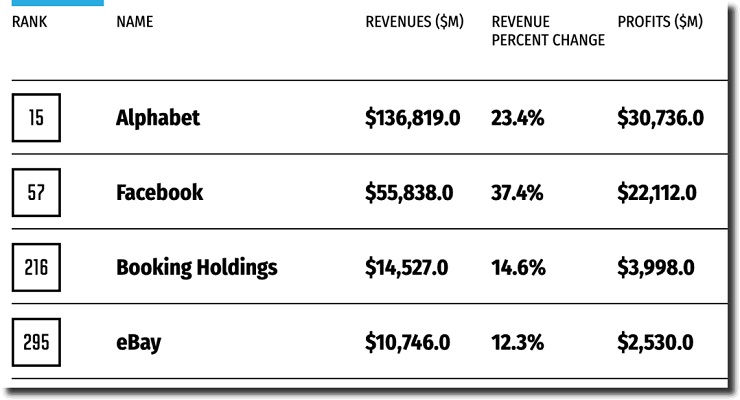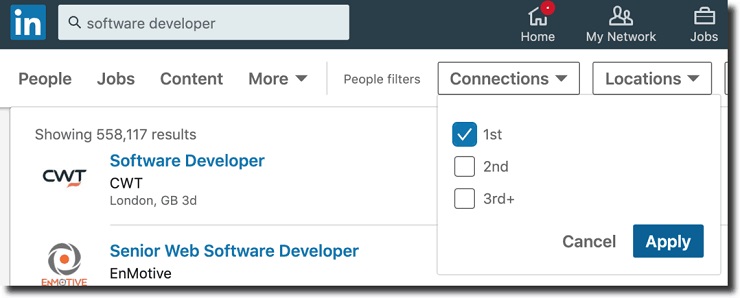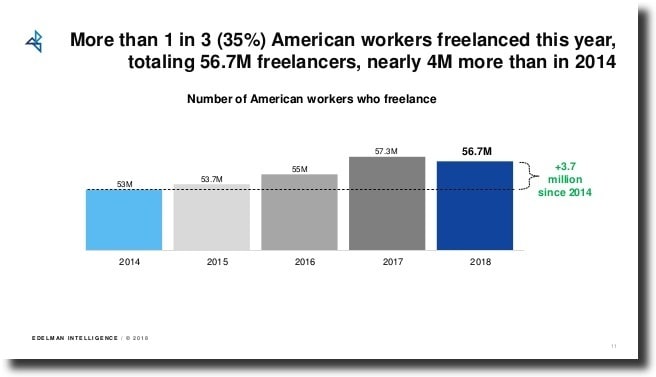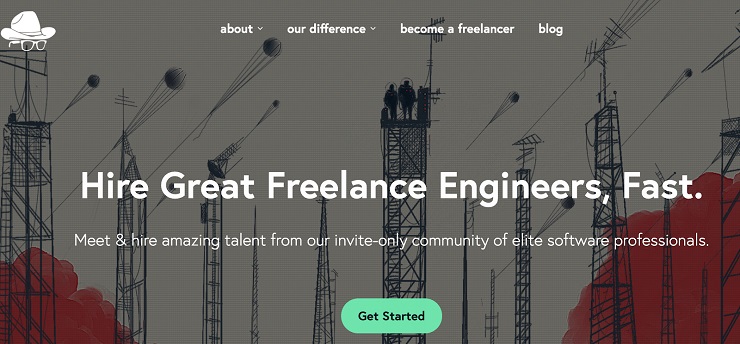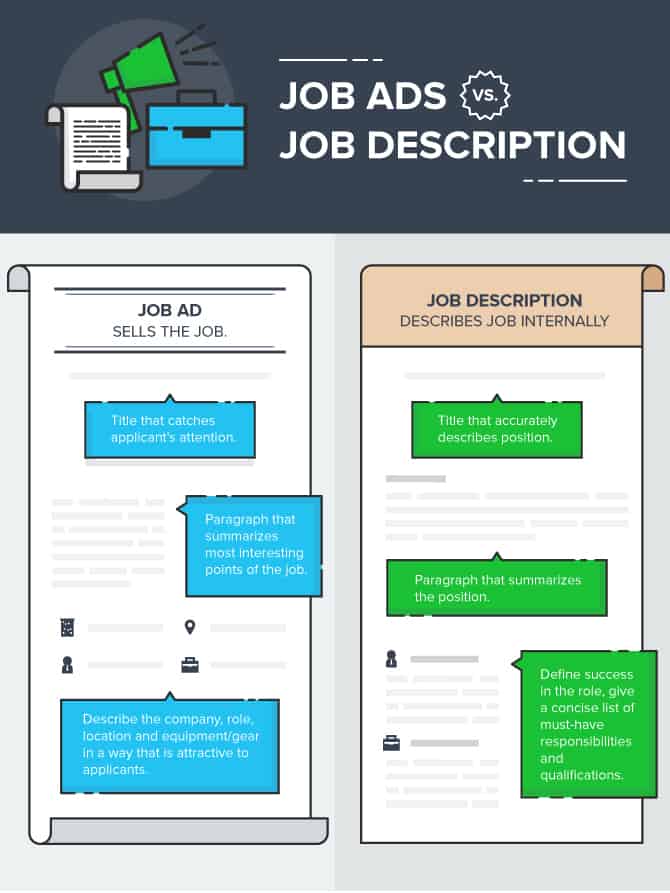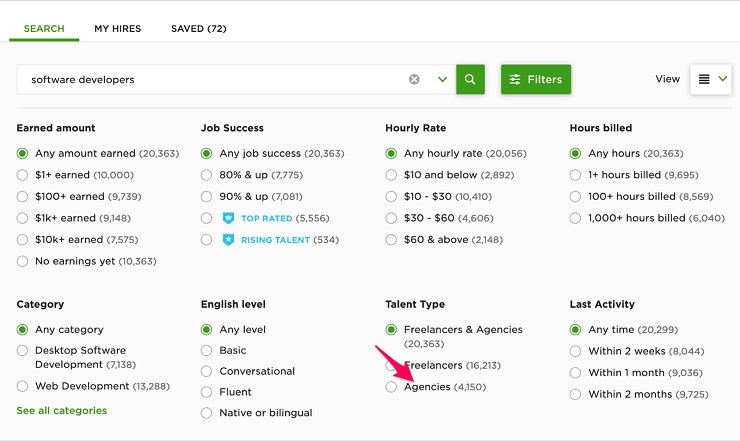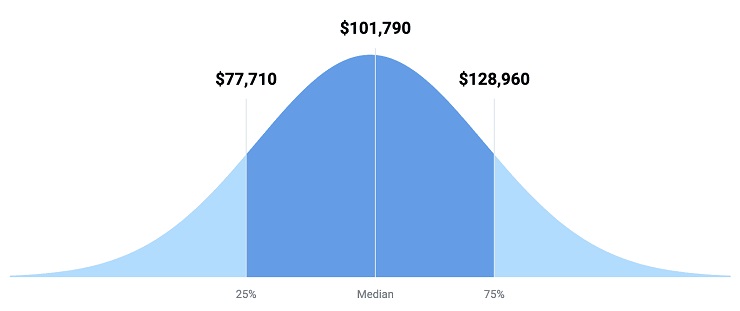Famed venture capitalist Marc Andressen once said, “Software is eating the world.”
Frightening, but there’s some truth to the statement.
Among Fortune 500 companies, 31 belong to the software industry, with combined revenues above $400 billion.
It seems software is, in fact, taking over the world. It’s also created a hot bed of entrepreneurial creativity, where founders beam with innovative, software-driven business ideas.
The problem is that many of the people who come up with these bright ideas also have little to no coding skills. A bit of a conundrum, isn’t it? 🤔
If you are thinking of starting a tech company but lack the tech skills to help you bring your idea to life, then you need to find a software developer. And even if you already have a technical cofounder and all you need is a new software developer to take your MVP to the next level, you also need to know how to recruit one.
In either case, in this article you will discover four ways you can find a software developer for your startup. And if you keep reading until the end, you will also learn what you need to look for before hiring one.
Sound interesting? Then let’s get started.
FREE MASTERCLASS: How To Start a Tech Startup And Get Your First Customer In 60 Days
Leverage Your Network
If you look at successful startup partnerships in history, where there was at least one technical cofounder and a non-technical one, you’ll see that most of them were born from their own networks.
Facebook started in the college dorm of three of its cofounders: Mark Zuckerberg, Dustin Moskovitz, and Chris Hughes. (The other founders, Andrew McCollum and Eduardo Saverin, were also Zuckerberg’s friends.)
The same can be said of Bill Gates and Paul Allen, the two iconic Microsoft founders, who were high-school friends before they founded their company in 1975.
There are similar stories about founding teams from companies like Google, PayPal, and more. The point is, most successful tech startups were born out of the networks of one or more founders.
While you may not be looking for a technical cofounder right now, the same logic applies when you are looking for a software developer: start with your network.
The trust you have in the people from your network will make the entire work process much easier.
Start by looking in your LinkedIn account for people who work as software developers. A simple search will show you those in your network who work in that field. Just make sure to filter by 1st connections, so you get only people who you know.
You can repeat the process in Facebook and Twitter by asking publicly for people who are software developers and are interested in working on a project. A tweet at your social network may not seem like a great hiring strategy, but it worked for Uber.
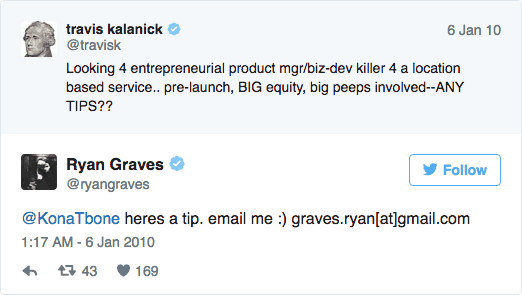
If you know anyone who you think could help you—especially someone who is aware of your entrepreneurial inclinations—then contact them.
Hiring from your network may seem risky or like nepotism, but that’s only a potential downside. Eric Breon, founder and CEO of vacation rental startup Vacasa, explains that “whatever qualities you’re looking for as you build your team—entrepreneurial spirit, a solution-driven attitude, passion over polish—you’ll recognize those qualities in people you know well and have worked with before.”
Working with people you know and like is a guaranteed way of starting a culture where trust and cooperation thrive. At least, such culture will work within the first few dozen employees, until your network (or the one of your cofounders and employees) is tapped out.
At the end of the day, hiring people you know and like is, as Sam Altman said in a memorable blog post, “pretty important to the right kind of company culture.”
Use a Freelancing Platform
In 2019, freelance software developers are abundant. Even in 2013, Computerworld calculated that there were 18.2 million software developers in the world, and according to their estimations, by the end of this year there should be 26.4 million developers.
What’s important for you to know is that many of these developers work as freelancers. A study done by Freelancers Union and Upwork found that 35% of Americans worked as freelancers in 2018—and a similar number is likely to be found in workforces similar to that of the United States.
Here’s where freelance platforms come into play. The largest example is Upwork, which was founded after the fusion of two of the previously largest platforms, Elance and oDesk. With more than 3 million jobs posted every year, Upwork is a great place to find a freelance software developer.
A quick search for software developers returns over 20,000 results!
As you can see, you can arrange the freelancers by their hourly rate, their experience, and many other useful filters.
Some of the other smaller, yet equally good freelance platforms include People Per Hour and Freelancer.com.
Particularly if your goal is to stay within a budget, these freelance platforms will be your best bet. This isn’t to say you can’t get high-quality software developers, but these platforms don’t screen their freelancers like other more field-specific platforms do.
Platforms like Toptal and Gun.io, on the other hand, differentiate themselves in that they vet their freelancers and only accept the best software developers.
Whatever platform you use, it’s important to take your time to pick the right freelancer. As Sebastian Janus explains:
One of the biggest mistakes founders undertake while hiring developers is to rush the process and thus, settling for non-ideal candidates or worse. Not only will mediocre or bad developers slow down your production cycle and blow up your costs, but it is much more likely that they will only attract other B-level developers in the future. Great developers want to work in a great team – bad developers want to look good compared to the others.
Fail to hire the right person, and you could end up wasting a lot of time and money. Make sure to be clear on the job listing—that is, what tech stack are you looking to use and why? What technical issues are you looking to solve? And most importantly, why should a developer want to work with you?
The more talented the developer you want to hire, the better your listing will need to be to attract them. Here are some tips that will help you write a job listing that will attract a lot of software developers.
Hire a Development Agency
In contrast with freelancers, agencies represent a more robust solution—one that has the resources to take a more in-depth and long-term approach to your development needs. If you don’t know everything that you need done to build your software, then a software development agency will give you its insights and experience to bring your ideas to life.
With the increased complexity, however, comes a price. Agencies manage multiple people—from project managers to developers to sales and more—and that raises the overall price of their investment.
When you pay an agency, you’re not just paying for the actual software developed, but often for support work as well, like marketing, administrative, and more.
Despite the higher cost, one benefit agencies offer over freelancers is that you can work with local companies you can meet personally. The fact you can meet face to face with the people who will work with you will make the entire working process much easier to manage.
According to Goran Paunovic, one of the main benefits of working with a local agency is that you can “work together to produce better ideas, make quick improvements, and collect input with various team members that are experts in their respective roles.”
To find an agency, you can use the same freelancing platforms mentioned before, and look for agencies in there. In Upwork, this is pretty easy to do. All you have to do is check “Agencies” within the “Talent Type” filter.
And there’s always a simple Google search, like “software development agency + YOUR CITY.”
Whether you work with a local or remote agency, you want to consider one as a business partner, one that will help you build a big piece, if not entire software you are looking to create.
If you need help to figure out the process of hiring a software development agency, this article will help you out.
Recruit a New Team Member
Last but not least, you can take the more traditional route and hire a full-time software developer as you’d hire any employee.
The big plus of this approach is that you will get someone who’s committed to your success. They have “skin in the game,” as the saying goes.
But as with anyone who’s ever hired someone can attest, this comes at a steep price. Software development has become one of the most valuable skills out there, and for that reason, hiring for such skills means it will be expensive to do so.
According to US News & World Report, the average yearly salary for a software developer in the United States is $101,790, with a low-paying software developer making an average of $77,710.
If you are thinking of taking this approach, then you must be completely sure that the person you are hiring is the right one. Not only the “cultural fit”—that is, how well the developer fits with the way your company works—but the actual skills matter a lot.
And unlike a freelancer who you can fire easily, hiring and firing a software developer comes at a price. Depending on the country you are residing, you can expect to pay taxes and severance payments, among other things.
Unless you are experienced at programming, or you are somehow knowledgeable on the topic, you’ll probably want to get some external or internal help from another software developer you trust when making the final hiring decision.
Robert Adixon, writing for the popular tech site HackerNoon, explains: “Finding many developers is easy, but screening them is difficult … If you find a developer fit for this role, still ask one more person from your company to interview the developer.”
If you have no software developer in your company, get some help from an experienced friend or acquaintance (assuming you can’t snatch them up!) to guide you in this process.
For example, you can ask your friend to develop a test project for the developer to finish. With these results, both you and your friend will be able to get a better idea of the type of work that person can do.
Hiring a software developer is indeed a complex task, but it can be worth the time and money in the long-term. Your company needs to be built to last for many years to come, and an employee will bring their best game to your company.
What to Look for in a Software Developer
So far, you have seen some different options for finding and hiring software developers. With that said, a big question you must ask yourself before you hire a developer isn’t just where to find one, but how to find the right one.
The entire work of a software developer is technical, complex, and abstract—if you aren’t aware of the skills it takes to hire a great developer, you won’t be able to make a smart hiring decision.
For that reason, as a non-technical-savvy person, you need to learn to vet and qualify the right software developer for your startup.
Beyond the fact that you need a developer who knows how to use a specific tech stack—like a specific Javascript framework, PHP, C#, and so on—you want to look for a developer who can actually solve real-life problems through technology.
According to Adixon, the coding skills of a developer aren’t as important as their capacity to solve problems:
Many people in the selection process give more emphasis to the developer’s coding skills. However, it is not the best way to hire developers. Instead, you should give him a real-life technology problem which has occurred within your organization and ask how he will handle and solve such a problem in the least possible time. This will actually give you a better idea about his skills and creativity and how he will work on a project when he joins your company.
You also need to look for a proactive attitude, one of pride and care for the work done. Tigran Sloyan, the CEO of recruiting startup CodeFights,wrote in Silicon Republic that “outstanding developers are much like outstanding artists. What they are creating is not just work they do to collect a cheque. There is a sense of pride in your craftsmanship and authorship.”
Damien Filiatrault, founder of Scalable Path,believes that a key aspect of a successful software developer is having an optimistic attitude toward challenges and setbacks: “A great programmer cares about your product. They are positive, willing to go the distance to get the job done and bring their best everyday.”
To develop such positive attitude, Filiatrault suggests, “A good way to instill a positive attitude is to give them interesting projects to work on, give them a sense of ownership and praise them for good work.”
Technical knowledge, problem-solving, optimism, and pride are just a few aspects that a developer must have.
A paper written by a team of researchers from the University of Washington explored the characteristics of successful software engineers from 13 Microsoft divisions and came to the conclusion that attitudes to look for include:
- A self-improvement spirit
- Passion for the work done
- Open-mindedness
- A data-driven attitude
- Perseverance
- Adaptability
- Self-reliance
- Risk-taking
Taking these attributes into consideration, there’s a lot you can search for. What’s important, however, isn’t to find a software developer that carries all of these attributes, but to cultivate them from the moment they work with you.
Our results strongly suggest that managers may consider cultivating the attributes within their teams. Managers may consider using the findings—with help from further research—to build a culture that is conducive to attracting, producing, and retaining great engineers.
FREE MASTERCLASS: How To Start a Tech Startup And Get Your First Customer In 60 Days
Here’s How to Find a Software Developer
The entire process of finding a software developer can be summarized in three steps:
- Define the place to look for them and start searching—open a job listing in a freelance platform, connect with former professional acquittances, talk to an agency, etc.
- Vet the software developers considering both the technical aspects of their job with their personalities and your company’s culture.
- Focus on cultivating successful attitudes in your software developers, including an open-mindness, risk-taking, and positivity, among others.
With these three steps, you will be on your way to hire the right software developers and start growing your tech startup.
Are you looking to find a software developer for your startup? If so, what has been your experience so far? Leave your comments below!
